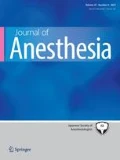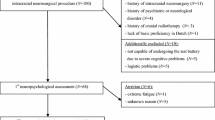Abstract
Purpose
The incidence of postoperative cognitive dysfunction (POCD) depends on the test battery and calculation method used. The measurements may be performed with a paper and pencil test battery or with a computerized test battery. The objective of this study was to measure the incidence and congruence of POCD by comparing a computerized test battery with a paper and pencil test battery in the same patient population.
Methods
In total, 67 patients were included: 30 consecutive in-patients undergoing surgery under general anesthesia and 37 non-surgical out-patients as control. Patients were tested with a paper and pencil test battery and a computerized test battery on inclusion in the study and 7 days later. Both test batteries covered the cognitive domains: visual attention, visual learning, memory, and speed of processing.
Results
The computerized test battery classified 10.0% (95% CI 3.5–25.6%) of the patients as suffering from POCD whereas the paper and pencil test battery classified 30.0% (95% CI 16.7–47.9%) as suffering (95% CI for difference 3.9–36.5%, P = 0.03). The inter-rater reliability between both test batteries showed moderate agreement (Cohen’s kappa of 0.41). All patients identified by use of the computerized test battery were also identified with the paper and pencil test battery. The paper and pencil test battery identified 6 additional cases.
Conclusion
In our study we demonstrated that the incidence of POCD measured with computerized test battery and paper and pencil test battery showed moderate inter-rater reliability. Use of neuropsychological test batteries theoretically covering the same cognitive domains does not automatically lead to the same classification of POCD.

Similar content being viewed by others
References
Monk TG, Weldon BC, Garvan CW, Dede DE, van der Aa MT, Heilman KM, Gravenstein JS. Predictors of cognitive dysfunction after major noncardiac surgery. Anesthesiology. 2008;108:18–30.
Moller JT, Cluitmans P, Rasmussen LS, Houx P, Rasmussen H, Canet J, Rabbitt P, Jolles J, Larsen K, Hanning CD, Langeron O, Johnson T, Lauven PM, Kristensen PA, Biedler A, van Beem H, Fraidakis O, Silverstein JH, Beneken JE, Gravenstein JS. Long-term postoperative cognitive dysfunction in the elderly ISPOCD1 study. ISPOCD investigators. International study of post-operative cognitive dysfunction. Lancet. 1998;351:857–61.
Johnson T, Monk T, Rasmussen LS, Abildstrom H, Houx P, Korttila K, Kuipers HM, Hanning CD, Siersma VD, Kristensen D, Canet J, Ibanaz MT, Moller JT. Postoperative cognitive dysfunction in middle-aged patients. Anesthesiology. 2002;96:1351–7.
Newman S, Stygall J, Hirani S, Shaefi S, Maze M. Postoperative cognitive dysfunction after noncardiac surgery—a systematic review. Anesthesiology. 2007;106:572–90.
Murkin JM, Newman SP, Stump DA, Blumenthal JA. Statement of consensus on assessment of neurobehavioral outcomes after cardiac surgery. Ann Thorac Surg. 1995;59:1289–95.
Silbert BS, Maruff P, Evered LA, Scott DA, Kalpokas M, Martin KJ, Lewis MS, Myles PS. Detection of cognitive decline after coronary surgery. A comparison of computerized and conventional tests. Br J Anaesth. 2004;92:814–20.
Collie A, Darby D, Maruff P. Computerised cognitive assessment of athletes with sports related head injury. Br J Sports Med. 2001;35:297–302.
Wild K, Howieson D, Webbe F, Seelyea A, Kayea J. Status of computerized cognitive testing in aging: a systematic review. Alzheimers Dement. 2008;4(6):428–37.
Müller SV, Krause N, Schmidt M, Münte TF. Cognitive dysfunction after abdominal surgery in elderly patients. Z Gerontol Geriatr. 2004;37(6):475–85.
Kox WJ, Spies C. Check-up Anästhesiologie Standards Anästhesie-Intensivmedizin-Schmerztherapie-Notfallmedizin. 2nd ed. New York: Springer; 2005.
Bohnen N, Twijnstra A, Jolles J. Performance in the Stroop color word test in relationship to the persistence of symptoms following mild head injury. Acta Neurol Scand. 1992;2:116–21.
Brand N, Jolles J. Learning and retrieval rate of words presented auditorily and visually. J Gen Psychol. 1985;112(2):201–10.
Collie A, Falleti MG, Silbert B, Maruff P. Determining the extent of cognitive change after coronary surgery: a review of statistical procedures. Ann Thorac Surg. 2002;73:2005–11.
Lewis MS, Maruff P, Silbert BS, Evered LA, Scott DA. The influence of different error estimates in the detection of post-operative cognitive dysfunction using reliable change indices with correction for practice effects. Arch Clin Neuropsychol. 2006;21:421–7.
Lewis MS, Maruff P, Silbert BS, Evered LA, Scott DA. The sensitivity and specificity of three common statistical rules for the classification of post-operative cognitive dysfunction following coronary artery bypass graft surgery. Acta Anaesthesiol Scand. 2006;50:50–7.
Rasmussen LS, Larsen K, Houx P, Skovgaard LT, Hanning CD, Moller JT. The assessment of postoperative cognitive function. Acta Anaesthesiol Scand. 2001;45:275–89.
Landis JR, Koch GG. The measurement of observer agreement for categorical data. Biometrics. 1977;33:159–74.
Linstedt U, Meyer O, Kropp P, Berkau A, Tapp E, Zenz M. Serum concentration of S-100 protein in assessment of cognitive dysfunction after general anesthesia in different types of surgery. Acta Anaesthesiol Scand. 2002;46:384–9.
Iohom G, Szarvas S, Larney V, O’Brien J, Buckley E, Butler M, Shorten G. Perioperative plasma concentrations of stable nitric oxide products are predictive of cognitive dysfunction after laparoscopic cholecystectomy. Anesth Analg. 2004;99:1245–52.
Abildstrom H, Rasmussen LS, Rentowl P, Hanning CD, Rasmussen H, Kristensen PA, Moller JT. Cognitive dysfunction 1–2 years after non-cardiac surgery in the elderly. Acta Anaesthesiol Scand. 2000;44:1246–51.
Rasmussen LS, Johnson T, Kuipers HM, Kristensen D, Siersma VD, Vila P, Jolles J, Papaioannou A, Abildstrom H, Silverstein JH, Bonal JA, Raeder J, Nielsen IK, Korttila K, Munoz L, Dodds C, Hanning CD, Moller JT. Does anaesthesia cause postoperative cognitive dysfunction? A randomised study of regional versus general anaesthesia in 438 elderly patients. Acta Anaesthesiol Scand. 2003;47:260–6.
Rasmussen LS, O’Brien JT, Silverstein JH, Johnson TW, Siersma VD, Canet J, Jolles J, Hanning CD, Kuipers HM, Abildstrom H, Papaioannou A, Raeder J, Yli-Hankala A, Sneyd JR, Munoz L, Moller JT. Is peri-operative cortisol secretion related to post-operative cognitive dysfunction? Acta Anaesthesiol Scand. 2005;49:1225–31.
Acknowledgments
Financial supported by grants from the Charité-Universitätsmedizin Berlin, Germany.
Author information
Authors and Affiliations
Corresponding author
Additional information
F. M. Radtke and M. Franck contributed equally.
About this article
Cite this article
Radtke, F.M., Franck, M., Papkalla, N. et al. Postoperative cognitive dysfunction: computerized and conventional tests showed only moderate inter-rater reliability. J Anesth 24, 518–525 (2010). https://doi.org/10.1007/s00540-010-0952-z
Received:
Accepted:
Published:
Issue Date:
DOI: https://doi.org/10.1007/s00540-010-0952-z




